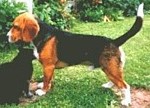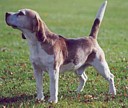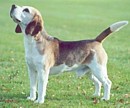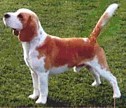Your Beagle is a
lifetime commitment - the lifetime of a beagle is, on average, between
11 and 14 years. We would like to believe that you would love and care
for your dog totally during its lifetime. However, if at any time you
find your beagle has become a problem in some way or requires re-homing,
we would urge you to contact (where feasible) the person you purchased
the pup off or a beagle or general dog club or a reputable dog rescue
centre. As breeders we would hope that our puppy owners would contact
us in the first instance but we know this does not always happen.
Beagles are a Hunting
Hound, a pack hound i.e. they are often kept, or were kept in "packs",
and are by type, a Scent Hound. This means that they track their quarry
by smell. They were initially bred to hunt Hare, and in most countries
they also hunt Rabbit. They can successfully hunt and kill Possum as
well. They were bred for scenting ability, staying power both in the
physical sense and also in the sense of being able to keep to a trail,
good voice, and size. They are hunted on foot, by that we mean that,
when they hunt as a pack, the huntsmaster and followers follow on foot
behind them, unlike Foxhounds and Harrier Hounds which are hunted on
horseback. They are quite an old breed and any good Beagle book will
go into their origins in detail. In New Zealand Beagles are kept as
pets, show dogs, obedience dogs, MAF Custom dogs, and there are also
a couple of dedicated hunt packs existing in the North Island.
There are many things
as a Beagle owner that you can do with your pet and we would encourage
you to join a local Beagle Club and find out what activities you can
get involved in and what suits you best.







